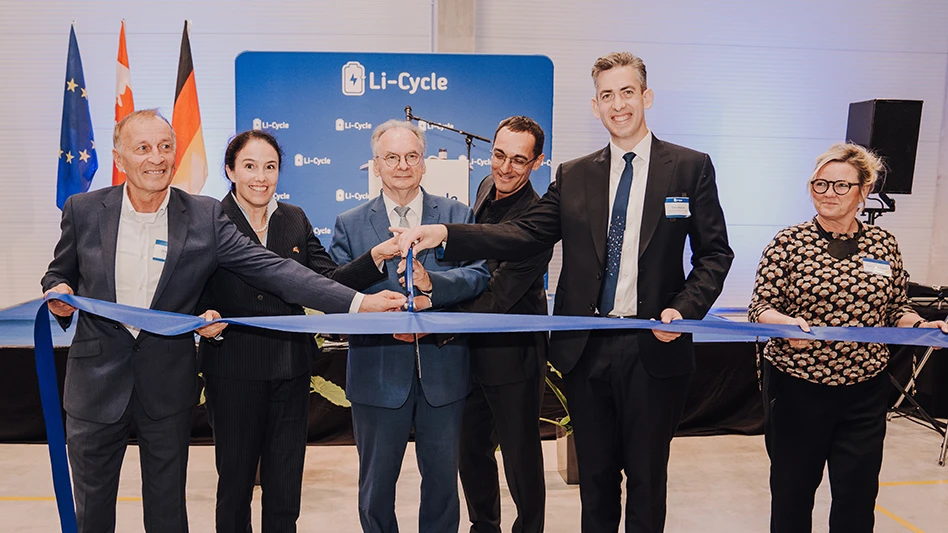
Photo courtesy of Li-Cycle Holdings Corp. and Business Wire
Toronto-based Li-Cycle Holdings Corp. celebrated in late September the grand opening of its first spoke recycling facility in Europe, located in Sülzetal near Magdeburg in the German state of Saxony-Anhalt.
“The new battery recycling plant in Sülzetal is an investment with a future,” says Dr. Reiner Haseloff, minister-president of Saxony-Anhalt. “It is an important contribution to a sustainable, efficient and competitive battery industry. The achievement of sustainability goals depends on a circular economy.”
The German spoke facility uses Li-Cycle's patented “Generation 3” technology to directly process all forms of lithium-ion battery scrap, including full electric vehicle (EV) battery packs, without the need for discharging, dismantling or thermal processing.
The firm says one production line is now fully operational, and a second parallel line is expected to start operating later this year. Each line has the capacity to process up to 10,000 metric tons of lithium-ion battery material per year, according to Li-Cycle.
With an additional 10,000 metric tons of ancillary capacity also planned, the facility would then reach a total processing capacity of 30,000 metric tons per year, making the facility one of the largest of its kind in Europe, Li-Cycle says.
“It was a pleasure to commemorate the official opening of Li-Cycle’s first European spoke alongside key stakeholders,” says Tim Johnston, executive chair and co-founder of Li-Cycle. “Our growing footprint in Europe is helping provide an environmentally friendly source of raw materials to support the continent’s transition to electrification.”
Richard Storrie, regional president with Li-Cycle, says, “Our first Spoke in Europe is supporting our growing customer base in Germany, the largest battery market on the continent. We look forward to continuing to work alongside the local community in Saxony-Anhalt for our clean energy future.”
Li-Cycle has additional European spokes planned in France and Norway. The spokes will produce black mass, which contains metals including lithium, nickel and cobalt.
The black mass Li-Cycle produces at its spoke network is intended to be hydrometallurgically processed at two hub facilities the company has under construction. Li-Cycle’s first hub facility, in Rochester, New York, is on track to be commissioned late this year, the firm says, and is being designed to process up to 35,000 metric tons of black mass annually.
In Europe, Li-Cycle is collaborating with Switzerland-based mining and metals firm Glencore International AG to develop a hub in Portovesme, Italy, on the island of Sardinia.
Phase 1 of the Portovesme hub is expected to start processing black mass in the first half of next year.
Latest from Recycling Today
- BMW Group, Encory launch 'direct recycling’ of batteries
- Loom Carbon, RTI International partner to scale textile recycling technology
- Goodwill Industries of West Michigan, American Glass Mosaics partner to divert glass from landfill
- CARI forms federal advocacy partnership
- Monthly packaging papers shipments down in November
- STEEL Act aims to enhance trade enforcement to prevent dumping of steel in the US
- San Francisco schools introduce compostable lunch trays
- Aduro graduates from Shell GameChanger program





